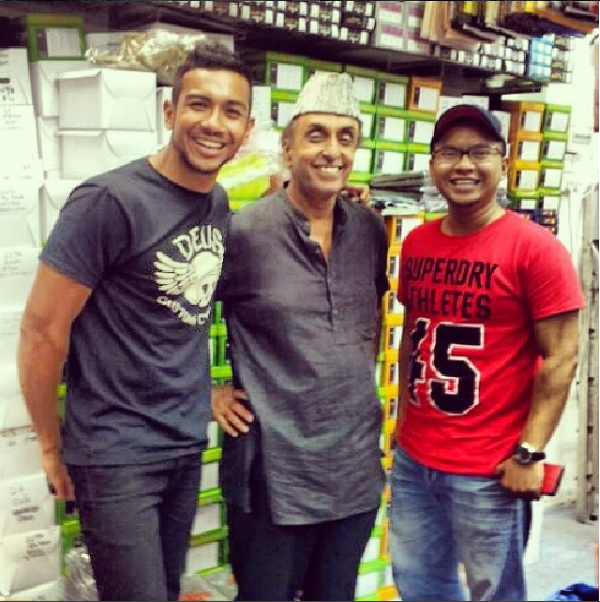More Than A Job - If the songkok fits: A three-generation affair
More Than a Job
Whatever your chosen craft, vocation or profession, we all have work to do. In a biweekly series, Yahoo Singapore talks to individuals who have chosen unique, unconventional and distinctive careers. For some, it’s about passion. Others have a sense of duty. But for all of them, it’s more than a job.

Photo: Andre He/Yahoo Singapore
It is a familiar sight among Muslim men in Singapore and neighbouring countries: a black hat, typically made of velvet or felt, and shaped like a truncated cone.
Known as a “songkok”, it is usually worn at formal occasions like weddings and funerals. Sometimes called the “peci” or “kopiah” — it is widely worn by Muslim men in Singapore, Malaysia, Indonesia and other countries.
Ask anyone in Singapore who wears a handmade songkok — chances are that it was made in a small, cramped shop in Tanjong Katong Complex. This is where the last full-time songkok makers in the country work.
In the beginning
Video by Andre He
Songkok maker Haji Abdul Wahab bin Haji Abdullah is a household name for Malay and Muslim families in Singapore.
The business, the brainchild of Abdul Wahab’s late father, started back in the 1940s as a small store in the old Geylang Serai market. Abdul moved the store to Tanjong Katong Complex in 2004 when the market closed.
“He was one of nine apprentices to learn the skill (from a master), but only two graduated,” said Abdul Wahab. On his part, the 56-year-old was the only one of 11 children to show any interest in learning the trade.
“I also learned from my late father when I was six, seven years old. Last time, there were so many makers. Now, I am the only one left. “
There is a shop in Arab Street shop operated by Baharuddin Sulaiman, who is in his 70s. But he has reportedly stopped sewing due to his failing eyesight and depends on two workers.
But there is hope yet — Abdul Wahab’s son Zulfadli, 33, helps out regularly in the store and hopes to eventually take over when his father retires. Zulfadli has been steeped in the trade from a young age, having made his very first songkok when he was about seven.
“I’m glad that our business still can exist, and I feel that it’s only because of the support of our community. And I hope that eventually, if I were to take over, the support will still be there,” said the full-time insurance agent, who has two other siblings.
Abdul Wahab certainly thinks he is ready to. Asked how good his son is, he told Yahoo Singapore, “For me, I can see, 90 per cent. His sewing is better than mine, and finer.”
Made by hand

Zulafadli and his father Abdul Wahab (left) Photo: Andre He/Yahoo Singapore
The annual peak period comes during Ramadan, when the store can receive as many as 1,000 orders. It’s a period that Abdul Wahab calls “harvest time”, when the extended family all come to help out.
The store stops taking orders some two weeks before Hari Raya Puasa, or the end of Ramadan. It is all centred on enabling father and son to work undisturbed, amid a whirl of cardboard and velvet and scissors and the din of the sewing machine.
The songkoks come in colours such as black, black gold, white and maroon. The cost of one ranges from $18 to $60. The store uses velvet imported from South Korea and the United States. Prominent customers include Senior Minister of State for Defence and Foreign Affairs Maliki Osman and the Sultan of Johor.
It takes about an hour to make a songkok. At his peak, the younger man can make between 30 and 50 pieces a day. “Sometimes, we don’t even have places to put the songkoks when we complete. So we have to keep calling customers to come and take,” said Zulfadli.
Each long day of work takes its toll. “My fingers become very stiff. I cut my fingers all the time, and it’s always the same spot on the middle finger. I’m used to it, but it’s still painful,” the father of three said with a laugh.
Taking care of the customer

Customers include well-known local singer Taufik Batisah (left). Photo: Zulfadli Abdul Wahab
The most important thing his father has stressed, said Zulfadli, is workmanship. He said, “You cannot do shoddy work, because people pay for this kind of thing.”
The lesson has stuck for Zulfadli. “Things like the hand sewing, I am quite particular. So if I see that it’s not nice, even if he sew, I take out, I will open and re-sew.”
It is also important to manage the customer’s taste and expectations. With each customer, Abdul Wahab suggests a design based on his features and his build.
The dying trade
But while there is also demand for songkoks during the wedding season, Zulfadli admitted that staying afloat is a challenge. “Truthfully, after Hari Raya, it’s just to cover rental. If one songkok is about 40, 50 dollars, and your rental is about 4,5000 dollars — how many songkoks you want to sell in one month?”
And while it is a “blessing” to be part of the third generation of a business, he added, “If there’s no festive season, I think we are also out of business long time already.” In the future, the shop may go online instead, or be based from home, said Zulfadli.
The best part of the job: the satisfaction of seeing a happy customer. “When they see the colour, they very happy. When they put it on the head and say, ‘Wah this is the best songkok that I have worn before, cannot compare with others.’ Then you have done your job well.”
Look out for the next instalment of More Than A Job on Monday, 11 September.
Related:


